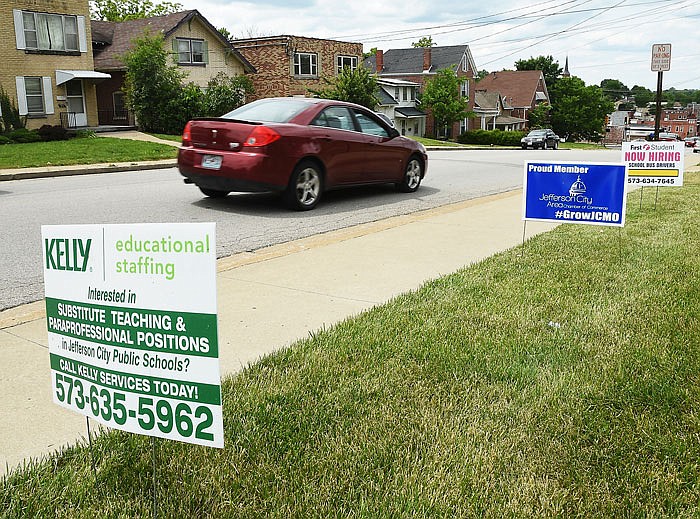A U.S. Supreme Court ruling has left Jefferson City's signs in question.
At the Public Works and Planning Committee meeting Thursday, Senior Planner Eric Barron said a U.S. Supreme Court case, Reed v. Town of Gilbert, Arizona, has forced the city to re-examine its code regulating temporary signs within city limits.
"It's kind of a complex issue," Barron said. "Cities across the nation are really dealing with this same issue. The ruling by the Supreme Court is that the message of a sign can not be regulated."
Barron did note there are exceptions to that for things like lewdness.
Currently, the city regulates temporary signs by whether its real estate, political, business, free speech, and directional and event signs. The ruling from the Supreme Court, Barron said, has rendered the current code for temporary signs unenforceable.
"If one of them is permitted, they must all be permitted," Barron said.
Because of that, Barron said city staff is in the process of trying to update the code as minimally as possible to bring it in line with the ruling, however there is one large complicating factor.
City attorney Drew Hilpert said state law specifies real estate signs can not be prohibited, which means for the city to abide by both state law and the U.S. Supreme Court ruling, no temporary signs could be prohibited.
"If we're going to follow state law, we can't prohibit the real estate signs, which really means you can't prohibit these other signs," Hilpert said.
Barron said staff will come back to the committee next month with recommendations and options for moving forward, with a final recommendation expected in July.
In other business, city staff also is looking to update the city's existing restaurant and food code. Janice McMillian, director of the Planning and Protective Services Department, said the current code is based on the 2001 U.S. Food and Drug Administration Model Food Code and the city would be adopting the 2013 State of Missouri Food Code.
The changes would include switching what is now called a critical violation to a priority violation and a non-critical violation to a core violation.
The proposed changes will be posted on the city's website in mid-June and open houses will be held in mid-July. An ordinance on the changes could be introduced to the City Council in August.
McMillian also presented the city's mosquito control plan to help combat mosquito-born illnesses, such as the Zika virus. The plan is very similar to one proposed in 1999 after the outbreak of West Nile virus in the country.
City staff will work to address mosquito control and educate residents on the best ways to prevent breeding grounds on their property, which is by eliminating standing water as mosquitoes can develop in any standing water that is present for more than five days.

